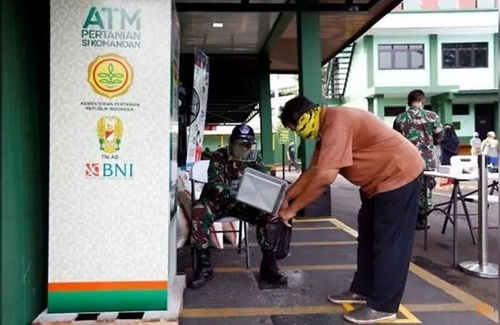There are ten “rice ATMs” in and around Jakarta. This is part of a government initiative to assist the people worst affected by the outbreak, which has caused millions to lose their jobs in Southeast Asia’s largest economy.
    |
 |
|
A man wears a protective face mask while receiving rice from an automated rice distributor amid the spread of COVID-19 pandemic in Jakarta, Indonesia on May 4. (Photo: REUTERS) |
Stacked with good-quality rice and operated by magnetic cards, the tall automated machines look much like a typical ATM, only that they pump out grain instead of cash.
Ibrahim, an army official supervising distribution, said a total of 1.5 tonnes of rice are prepared for around 1,000 residents every day. The distribution is carried out every day, even on weekends.
More than 14,000 Indonesians have been infected with the coronavirus since early March, with 991 killed by the disease, the highest death toll in East Asia outside China.
Indonesian Finance Minister Sri Mulyani Indrawati told the parliament last week the pandemic has set efforts to eradicate poverty back a decade.
In March, Indonesia announced a 25-billion-USD stimulus package in response to the COVID-19, pledging to provide social welfare for up to 10 million households, including food assistance and electricity tariff discounts.
Residents eligible for the rice ration include daily wage earners, the unemployed, those who do not own a house and people who live below the poverty line.
The “rice ATM” was first introduced by a Vietnamese entrepreneur in Ho Chi Minh City early last month to provide free rice for people out of work because of the COVID-19.
Source: VNA